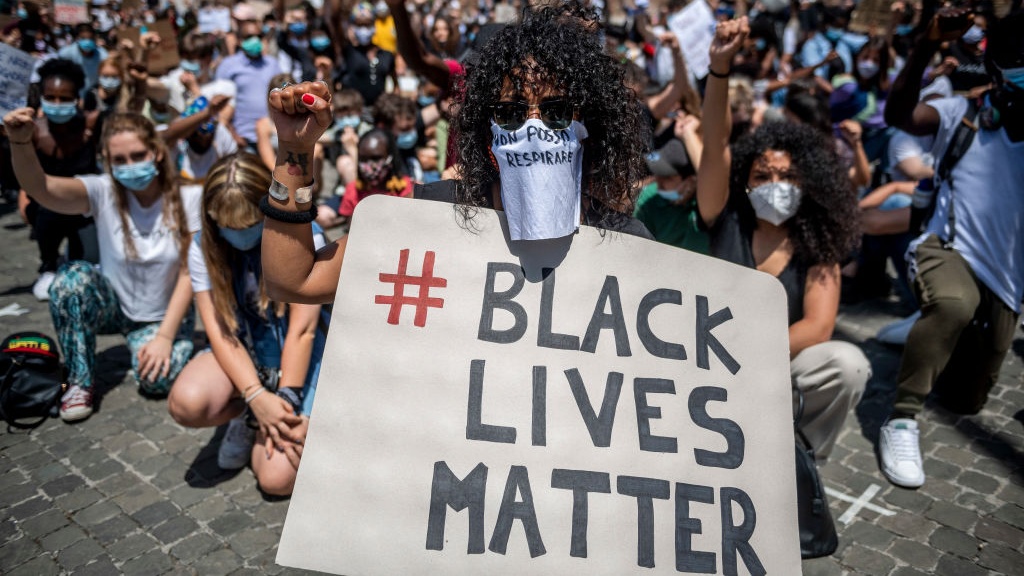The Movement for Black Lives (M4BL) is ensuring the global protests in response to the killing of George Floyd aren't in vain.
The M4BL announced on Tuesday that it was joining forces with U.S. Reps. Ayanna Pressley and Rashida Tlaib to introduce the Breathe Act, a wide-ranging bill aiming to reform the criminal justice system and address systemic racism.
The group made the announcement during a virtual unveiling, sharing parts of the bill through a series of speakers, ranging from Black Lives Matter co-founder Patrisse Cullors and Tlaib to the mothers of Michael Brown and Eric Garner, Lezley McSpadden and Gwen Carr.
The bill's creators want to reimagine how the U.S. government approaches criminal justice and repurpose many of the grants currently handed out to police departments and law enforcement agencies. The group wrote in a statement that the government has "funded mass criminalization through grant programs that incentivize arrests, construction of prisons, hiring of police officers, and the militarization of police."
"This visionary bill divests our taxpayer dollars from brutal and discriminatory policing and invests in a new vision of public safety—a vision that answers the call to defund the police and allows all communities to finally BREATHE free," the group explained on the bill's website.
"In honor of the lives of those stolen by police and state-sanctioned violence — Breonna Taylor, Tony McDade, Natasha McKenna, George Floyd, Aiyana Stanley-Jones, Elijah McClain, Pearlie Golden, Kayla Moore, Freddie Gray, Atatiana Jefferson, Oscar Grant, and far too many more," the statement continued. "We are rising up against all the ways that the criminal-legal system has harmed and failed to protect Black communities."
The M4BL consists of more than 150 groups, the Associated Press reported.
The unveiling event also featured comments from John Legend, professor Marc Lamont Hill, Three Point Strategies founder Jessica Byrd, Electoral Justice Project co-creator Kayla Reed and Essie Justice Group founder Gina Clayton-Johnson.
Clayton-Johnson explained that the Breathe Act is "a people-powered bill" that attempted to take many of the ideas expressed during the recent countrywide protests and turn them into actionable items for the government.
The four-part act is explained in further depth in a 13-page bill summary, which illustrates its proposed changes.
According to Clayton-Johnson, the first section focuses on incarceration and policing, aiming to enact the idea of defunding the police by removing federal funding from programs that contribute to "the militarization, surveillance, incarceration and impoverishment of Black communities."
With the money removed from those programs, the second part of the act suggests more money be poured into incentives promoting community safety and alternative modes of justice. Section three is an extension of that, listing the environmental, educational and economic programs that could receive more federal funding.
The act describes a variety of initiatives, including increased school funding, homelessness programs, clean water efforts, expanded Medicaid and improved employment measures.
A number of other problems are addressed in the final section of the bill. The group lists federal election funding and the restoration of voting rights for incarcerated and formerly incarcerated people as some of the efforts that will address the systemic racism millions of people face.
Pressley said in a press release sent to Blavity that she was glad to champion the bill.
“Hundreds of years of institutionalized oppression will not be undone overnight, for racism in America is as structural as the marble pillars of this nation’s most sacred institutions," the Cincinnati, Ohio native said. "I was glad to join the Movement for Black Lives this morning to demand that our government put an end to the racist policies and systems of oppression that for too long have failed to center the dignity and humanity of our people."
As an ally, Tlaib echoed those sentiments.
“In the midst of one of the largest uprisings for justice in our country’s history, I am proud to join this conversation as an ally to all those who are calling for a federal policy vision that defends Black lives and invests in safe, thriving communities. The BREATHE Act represents a comprehensive vision that I am proud to support,” Tlaib said in her statement.
“I stand with Black people across our country — and especially with Black women — as someone who in part was raised by Black women in the Southwest Detroit community where I grew up," Tlaib added. "Those women taught me the meaning of solidarity when they were there for my immigrant mother and made her feel safe even as their own families and communities were being brutalized. In continued solidarity with those women, I am committing to the process of developing and implementing a federal policy vision that truly keeps our communities safe."
According to the AP, the M4BL will be hosting the 2020 Black National Convention on Aug. 28 in an effort to coalesce around a plan of action for the November elections. The group is aiming to prepare a set of demands for the first 100 days of whichever administration wins the presidency.
The AP likened the convention to other historic Black events like the 1972 National Black Political Convention in Gary, Indiana, W.E.B. Du Bois' 1905 Niagara Movement and 1998's Black Radical Congress in Chicago.
